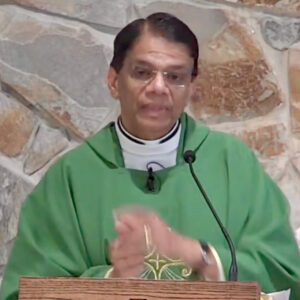We cannot share in God’s glory without the cross. When Jesus prophesied his own betrayal and crucifixion, it did not make any sense to his disciples because it did not fit their understanding of what the Messiah came to do. And they were afraid to ask further questions.
The Apostles don’t understand this second announcement of Christ’s Passion. They begin arguing over issues of succession—over who among them is greatest, who will be chosen to lead after Christ is killed.
They are thinking not as God but as human beings. And Jesus teaches the Twelve—the chosen leaders of His Church—that they must lead by imitating His example of love and self-sacrifice. They must be “servants of all,” especially the weak and the helpless—symbolized by the child He embraces and places in their midst.
Jesus made a dramatic gesture by embracing a child to show his disciples who really is the greatest in the kingdom of God. What can a little child possibly teach us about greatness? Children in the ancient world had no rights, position, or privileges of their own. They were socially at the “bottom of the rung” and at the service of their parents, much like the household staff and domestic servants.
Jesus elevated a little child in the presence of his disciples by placing the child in a privileged position of honor. Who is the greatest in God’s kingdom? The one who is humble and lowly of heart—who instead of asserting their rights willingly, empty themselves of pride and self-seeking glory by taking the lowly position of a servant or child.
Jesus, himself, is our model. He came not to be served, but to serve. Paul the Apostle states that Jesus emptied himself and took the form of a servant. Jesus lowered himself and took on our lowly nature that he might raise us up and clothe us in his divine nature.
This is a lesson for us, too. We must have the mind of Christ, who humbled Himself to come among us must freely offer ourselves, making everything we do a sacrifice in praise of His name.
Love and Prayers,
Fr. Charley
